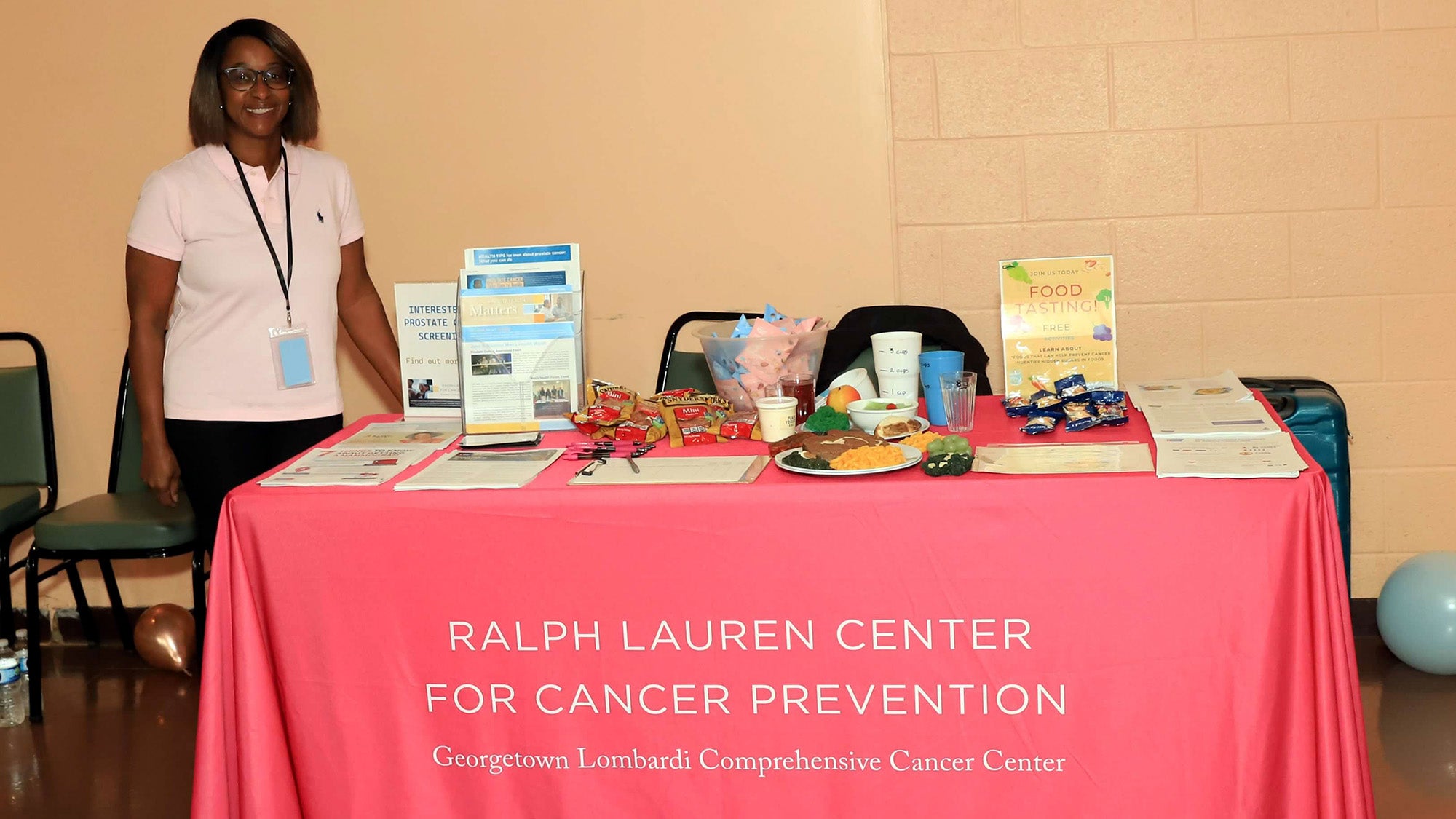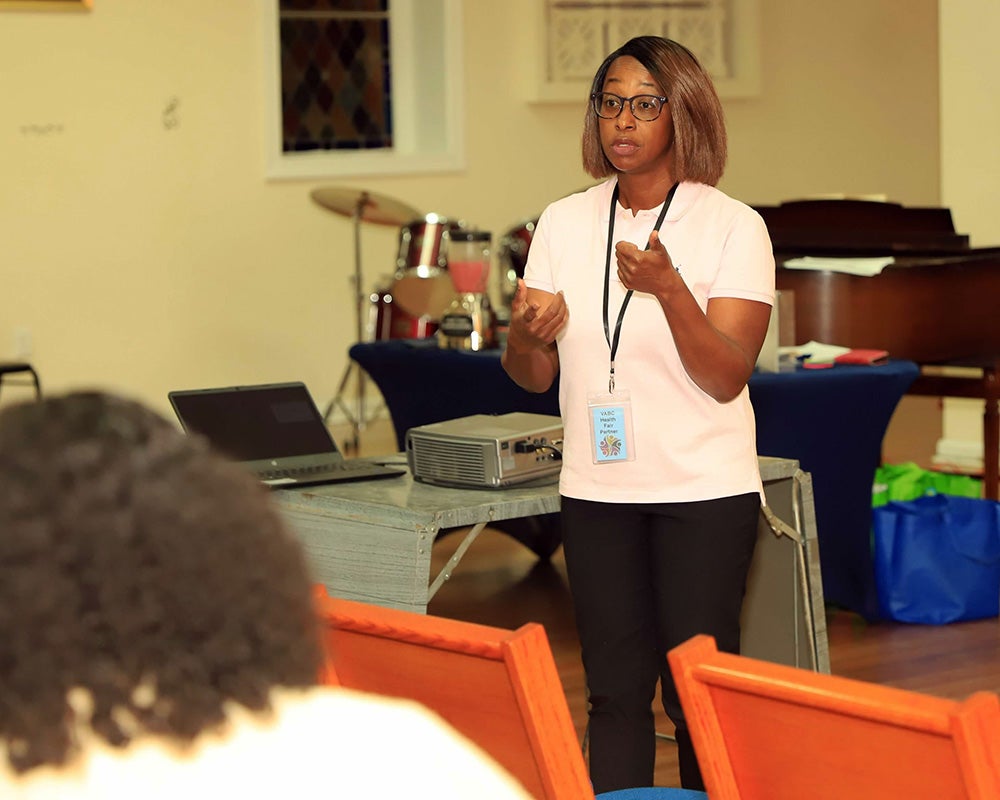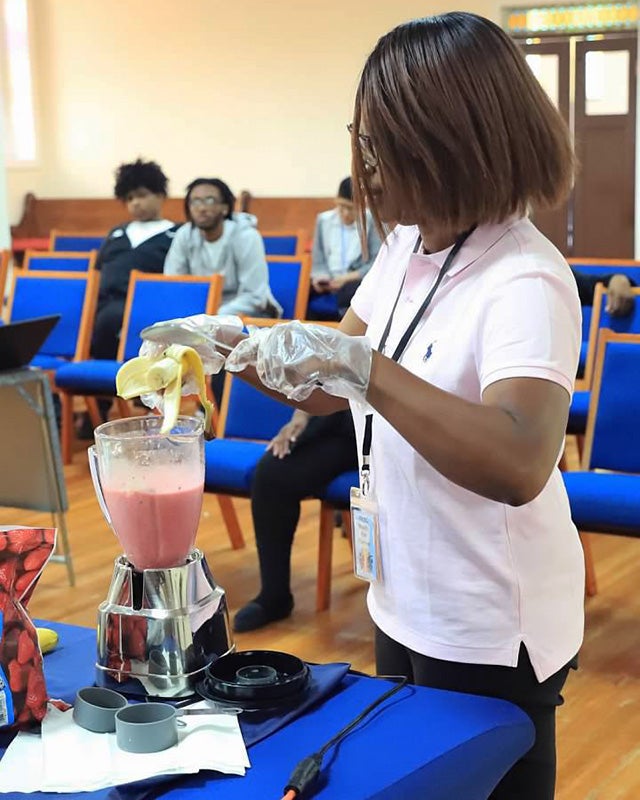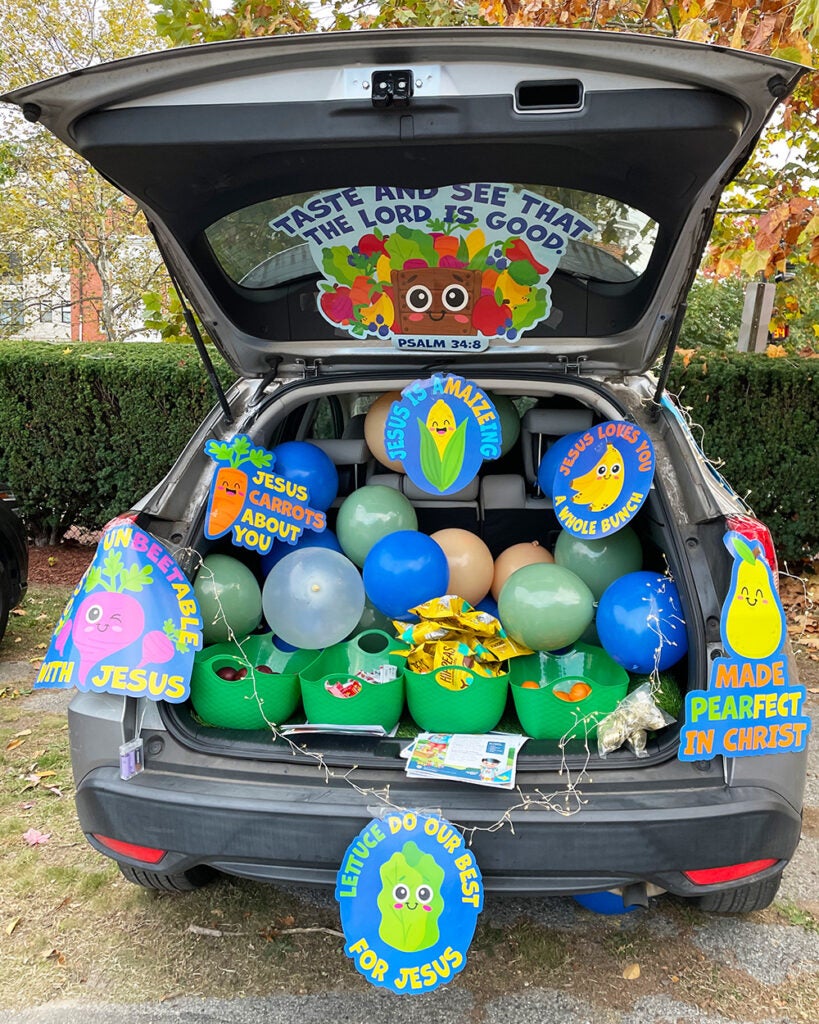Ralph Lauren Center Pastoral Initiative Collaborates with Local Churches to Offer Cancer Education and Screening

Posted in Lombardi Stories | Tagged cancer, cancer prevention, community engagement, community outreach, pastoral initiative, Ralph Lauren Center for Cancer Prevention
(September 18, 2025) — Community outreach and engagement, led by associate director Chiranjeev Dash, MBBS, MPH, PhD, is a key component of the work at Georgetown University’s Lombardi Comprehensive Cancer Center, and community outreach and engagement activities focused on cancer screening and prevention are a priority for the Ralph Lauren Center for Cancer Prevention at Georgetown Lombardi.
One example of those efforts is the pastoral initiative at the Ralph Lauren Center. Led by Dash, Mireille Bright, PhD, MPH, pastoral initiative coordinator, and Aisha Choudhri, MPH, CHES, community health educator, the pastoral initiative connects with the leaders of local churches to offer cancer prevention education, screening and navigation services.
“The pastoral initiative is the Ralph Lauren Center’s commitment to engage churches within our catchment area and to make sure that we educate and bring cancer screening services directly to the community,” Bright said.
As a public health nutritionist with a certificate in pastoral studies, Bright approaches health from a holistic perspective.
“I believe that because we are as much spiritual as physical beings, we need to approach health from that lens and work to address the needs of both spirit and body, especially in the context of the church,” she said. “There is room for cancer prevention and nutrition education in the church.”
Serving Churches in D.C., MD and VA
Located in Washington, D.C.’s Ward 8, the Ralph Lauren Center meets people where they are by attending regularly scheduled workshops and outreach events throughout the region to educate underrepresented communities about breast, prostate, colorectal and lung cancer, and to provide screening and navigation services. This critical work is made possible by collaborations with more than 50 community organizations, including nonprofit organizations, faith-based groups, community clinics, government agencies and senior housing facilities.
Since the April 2023 launch of the Ralph Lauren Center, such partnerships have enabled its staff to host 267 outreach events, reaching approximately 8,000 attendees and providing a direct line into the community.
“Communities of faith and churches are great avenues for cancer prevention work,” Bright said. “There’s definitely interest in the communities for the work we do.”

To establish partnerships with local churches, Bright reaches out to their leaders or representatives to assess interest, then follows up with meetings over Zoom to discuss the mission of the center and services they can offer the community. When church leaders express interest in working together, the details of the partnership are discussed and agreed upon. A letter of agreement is then approved and signed by both parties.
“The letter is not a legal document, rather an understanding of our commitment to work together,” she said. “Some churches may not wish to engage in a partnership, but this has never prevented us from working with them or providing services. ”
The pastoral initiative collaborates with churches within Georgetown Lombardi’s regional catchment area, which includes Washington, D.C., as well as surrounding counties in Maryland and Virginia.
“Some of the churches that collaborate with the pastoral initiative have significant immigrant populations, which allows us to have an even broader and much-needed reach,” Bright said. “Whichever churches, whichever denominations wish to work with us, we’re more than happy to collaborate with them, provided their goals and ours align.”
Bringing Resources to Local Churches
From health fairs to small group discussions, the pastoral initiative supports churches by sharing education around breast, colorectal, lung and prostate cancer, as well as nutrition and fitness.

“Churches have different calendars of events within the year, and we coordinate our activities around those events,” Bright said. “We’ve also done virtual events where we present various nutrition and cancer-related topics and offer prostate health education where we’ve invited a physician for a question and answer segment.”
The pastoral initiative can also connect churches with the patient navigation services offered by the Ralph Lauren Center.
“We have an excellent cancer navigation program, where we’re able to work through multiple barriers to care with groups for whom English is not their first language or who need transportation to and from mammography services, ” Bright said. “We can make appointments for women, take them to their appointment with our van, help them fill out forms while in the hospital and take them back to their community.”
In addition to patient navigation, the pastoral initiative educates community members about clinical trial opportunities. “Clinical trial participation is an extension of the screening that we do,” Bright said.
“Churches and organizations know that when we come, we’re not only bringing screening,” Bright added. “There’s also going to be education and opportunities to learn and participate in ongoing research in a very transparent way. I think that’s what makes us attractive.”
A Holistic Approach
In collaboration with the churches they serve, the center developed a prostate cancer training module that empowers key members within churches to communicate with others about the importance of screenings.
“We’re training churches to talk about screening to their congregation, and within that module we have incorporated a faith session to help people understand and see the connection between faith and health,” Bright said.
Bright’s ability to connect caring for one’s physical health to their faith has been helpful in her work with the pastoral initiative.
“When people are reminded that it’s our responsibility to take care of this body and that being healthy is the opportunity for each one of us to accomplish our purpose in life, eating healthy and going to get screened makes sense,” she said.
Making An Impact

The number of churches collaborating with the pastoral initiative continues to grow, holding about five to 10 events per month. On September 20, they will host their first men’s health event at Sycamore & Oak, a new retail village and event space in Ward 8.
Reflecting on her experiences with the pastoral initiative, Bright recalled a pop-up event she collaborated on with a local pastor and the Washington Metropolitan Police Department. After the event, the pastor was approached by a police officer who had seen Bright talking with one of the attendees.
“She had seen him many times at different events and that person was never receptive to receiving any materials, but that day, when we were there, somehow, we don’t know if it was our branded table cover, but something caught people’s attention and that person who never would have talked to people talked to us,” she said.
Being a part of the pastoral initiative has been a way for Bright to turn her own beliefs into action.
“I’m of the Christian faith, and there’s a verse in the Bible that says that our body is a temple of the Holy Spirit, so when people get screened, they’re honoring their faith and their belief,” she said. “The fact that someone is taking care of their body shows a reverence to the body that was given to them.”
Kat Zambon
GUMC Communications
